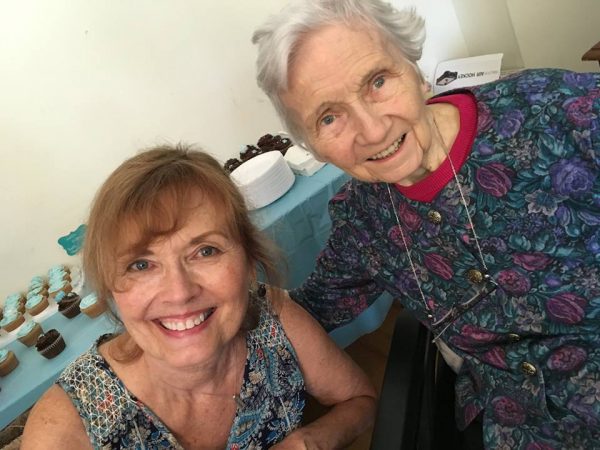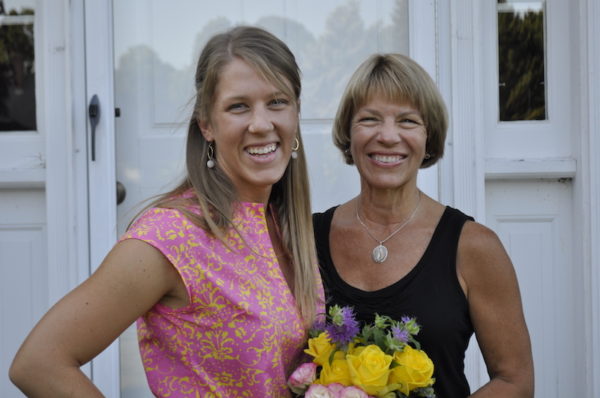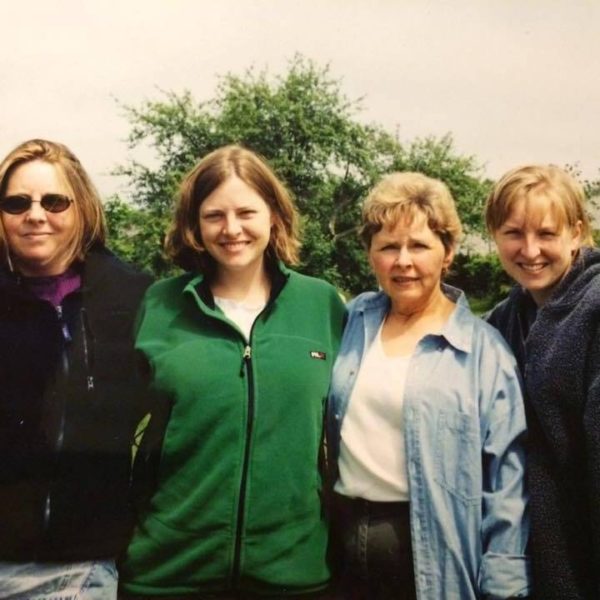Today — September 6, 2018 — is the second anniversary of my mother’s death. I remember how, almost immediately after she died, I could feel that my world had shifted. The way I described it was, “I’m trying to navigate my once familiar world but I seem to have lost my bearings.” I coped by attending to what needed to be done. When you keep yourself busy, it can kind of blot out what’s really going on, at least in the moment.
Jen Willis did something similar right after her mother Jan died on February 5, 2017.
I don’t have strong memories of what those early days looked like. There seemed to be lots of jobs to do and tasks that I wanted to help my dad and brother complete. After a week or so I returned to work and basically asked people not to bring it up during the day. Living and working at a boarding school made it challenging as the people I worked with were also close friends, but I knew that I needed to compartmentalize or I probably wouldn’t be able to make it through the day without breaking down. I tried to use other time to process the loss as best I could and was very lucky in the support of my wife and extended family. Even though I remember feeling well supported and was flooded with cards, calls, texts, etc., I also felt very alone during that time. Work and a one-year-old both kept me busy.
It’s been nearly a year since Kathryn Tewhey’s mother Gloria died and she still can’t believe she’s gone.
The moment I heard it and still today and yesterday and the day before, it’s disbelief, disbelief. She was that strong of a presence. I still cannot believe it. I wake up every morning and think I have to tell her this or that and then, I think, she’s not there. It’s getting a little bit easier and I’m dealing with it. I’ve found ways to have her in my life even though she’s not here, but I cannot look at her picture because it’s too hard.
 Carol Schoneberg, an end-of-life educator and the bereavement services manager at Hospice of Southern Maine, says no two people’s grief looks the same, even in the same family. What’s important is to let people grieve in their own way and at their own pace.”The fact is,” she said, “grief is all over the map and it’s messy. It’s different for every person. And at the same time, there are all these universal aspects of grief.”
Carol Schoneberg, an end-of-life educator and the bereavement services manager at Hospice of Southern Maine, says no two people’s grief looks the same, even in the same family. What’s important is to let people grieve in their own way and at their own pace.”The fact is,” she said, “grief is all over the map and it’s messy. It’s different for every person. And at the same time, there are all these universal aspects of grief.”
In her view, we eventually move closer to healing by embracing our grief. “By meeting our grief head-on,” she said. “I have clients who will say, I can’t, I can’t. I’m terrified of that. I’m afraid if I start crying I’ll never stop. When those triggers come unexpectedly you want to let them come.”
Many people get caught up in worrying that they’re not grieving “the right way.” And sometimes, others will question why they’re doing a particular thing or haven’t moved on yet. They may declare, for instance, that’s it’s weird to kiss the urn that holds their loved one’s ashes every night before bed or to wear a necklace that contains some of their ashes or carry a stone in your pocket that their loved one had found. “That’s all normal,” said Carol. “That’s part of the continuing bonds that we find are very, very helpful for the bereaved.”
When she explains that there is no wrong way to grieve and gives someone a list of behaviors and feelings — all normal — that are associated with grieving, she hears them sigh with relief, sees their shoulders and faces relax, feels their spirit rise. Here are some of the terms she shares:
Feelings Associated with Grief
| Shock | Frustration | Anxiety | Inadequacy |
| Denial | Relief | Sadness | Shame |
| Disbelief | Anguish | Guilt | Worthlessness |
| Numbness | Loneliness | Anger/Rage | Failure |
| Confusion | Depression | Yearning/Searching | Fear of death |
| Alarm | Irritabiity | Despair | Restlessness |
| Abandonment | Hopelessness | Panic | Uselessness |
| Emptiness | Release | Reconciliation | Healing |
Behaviors Associated with Grief
| Crying | Sobbing/wailing | Avoiding crowds | Disorganized |
| Carrying out rituals | Forgetful/can't focus | Turning inward | Regression |
| Seeking solitude | Blaming/critical | Unable to concentrate | Apathetic |
| Withdrawn | Isolating | Disoriented | Seeking forgiveness |
| Sense of freedom | Substance abuse | Preoccupied with the deceased | Daily trips to the cemetary |
| Avoiding cemetary | Constant busyness | Staying in bed | Contact with deceased |
Physical Symptoms Associated with Grief
| Deep sighing | Extreme fatigue | Stomach problems | Gnawing feeling in pit of stomach |
| Headaches | Decreased libido | Muscle aches & pains | Startle response |
| Weakness | Dizziness | Insomnia | Something stuck in throat |
| Weight gain | Shortness of breath | Nausea | Rheumatoid arthritis |
| Asthma | Heart palpitations | Trembling | Compromised immune system |
| Weight loss | Exacerbation of prior health issues |
Another thing that can happen when you are grieving is that you stop taking care of yourself. It started to happen to Kathryn, who worked hard to turn things around.
After my mother died, I drank wine every night. I didn’t know what to do, I felt so horrible. I decided to get counseling, ran a 5-K, and got a new job. I tried to do things that would make me healthier.
Perhaps the single most important thing to remember about grief, says Carol, is that sad isn’t bad, grief is not negative. It’s not wrong and it’s not a mistake. It’s a natural response to losing someone you love.
Grief can be our most profound spiritual teacher, deepening our connection to life, and leaving us transformed in the process. When I am deep in grief, I look to those who have traveled the grief journey before me and come out on the other side. They tell me it will get a little softer and easier over time, and the huge boulder of grief I now carry on my back will little by little get smaller and become more manageable until eventually it is reduced to a small polished stone I can carry in my pocket. Their ability to rejoin life tells me I will one day do the same, not so much as the person I once was, but rather a wiser and more humane version of myself, capable of once again living a life full of meaning and joy — proof of the mysterious resiliency and capacity for healing present in every one of us.
On Monday, I will share two perspectives on losing a spouse. Jackie Conn’s husband Tim died in February and John Tewhey’s (Kathryn’s father) wife Gloria died last September. They both had long, loving marriages. They each deal with their grief in different ways.
Tomorrow, I will be spending the day with my granddaughter. There is nothing like the joy of playing with a two-year-old. I know my mother would have loved her!




Thanks Diane for this wonderful article.
I’m sharing it and hope it reaches those of my family and friends who need it.
Hi Maryanne. Thank you!
I, too, have a two-year-old granddaughter. I have said so many times how much I’d like my mother to see her. She has been gone twenty-one years. Those thoughts about wanting to share things with your mother never end. Time doesn’t heal everything!
I also feel that way about my grandmother who died just a few months after my oldest daughter was born.
My Mother has been gone for 22 years, and I still miss her every day. I have now added my Dad and husband to the list of dear ones that I remember daily. I think that is the best tribute to how wonderful they were, and how important they still are to me.